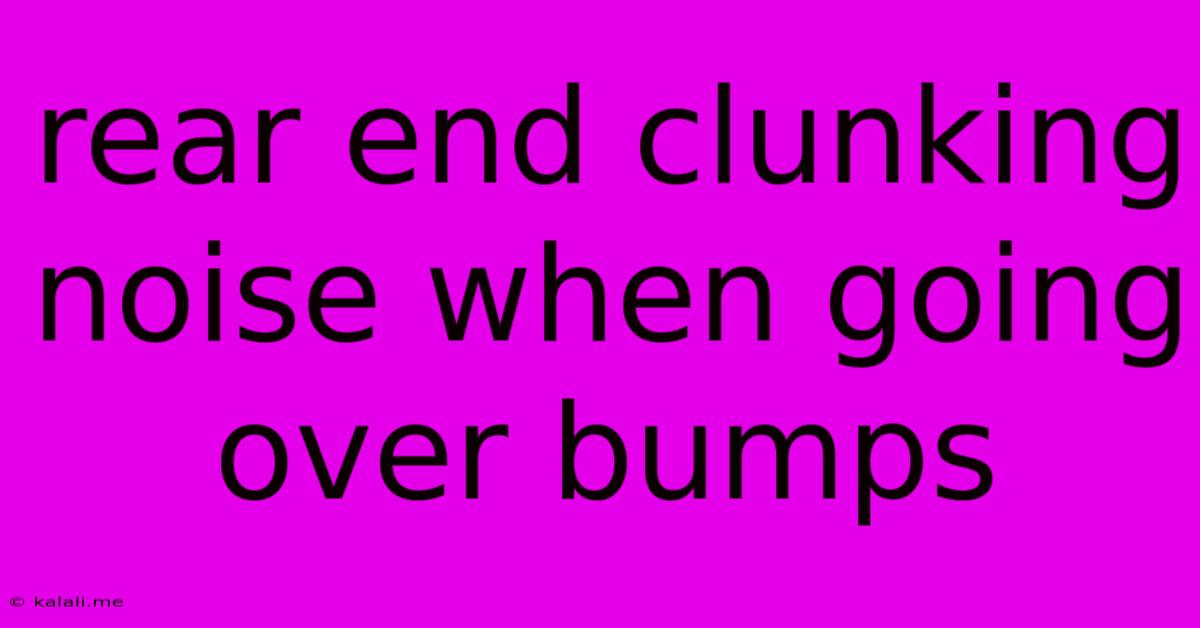Rear End Clunking Noise When Going Over Bumps
Kalali
May 20, 2025 · 3 min read

Table of Contents
Rear End Clunking Noise When Going Over Bumps: Causes and Solutions
A disconcerting clunking noise emanating from the rear of your vehicle when driving over bumps is a common problem that can stem from various sources. Ignoring this issue can lead to more significant and costly repairs down the line, so understanding the potential causes and solutions is crucial. This article will explore the most frequent culprits behind this annoying sound and guide you toward identifying the problem and finding the right fix.
Possible Causes of Rear End Clunking
Several components in your vehicle's rear suspension and drivetrain can cause a clunking noise when traversing bumps. Let's examine the most common culprits:
1. Worn-out Shocks or Struts
Worn-out shocks or struts are a frequent source of clunking noises. These components dampen the movement of your suspension, and as they age, they lose their effectiveness. This leads to excessive bouncing and jarring, often accompanied by a clunking sound. Inspect your shocks for leaks, excessive wear, and damage. A visual inspection is a good first step, but a professional mechanic can conduct a more thorough assessment to confirm their condition.
2. Damaged or Loose Suspension Components
Various parts within the rear suspension system can become damaged or loose over time. This includes:
- Worn-out bushings: These rubber components connect suspension parts and absorb vibrations. Worn bushings allow excessive movement, leading to clunking noises.
- Broken or worn-out springs: Broken or severely sagging springs can cause a significant clunking noise, especially when going over bumps or potholes. Visually inspect the springs for any obvious cracks or damage.
- Loose control arm bolts or other suspension components: Over time, bolts can loosen, causing play in the suspension system and resulting in clunking. Check all bolts and ensure they are properly tightened. Note: This is best handled by a qualified mechanic to avoid incorrect tightening.
3. Issues with the Rear Differential
In rear-wheel-drive vehicles, problems within the rear differential can manifest as clunking sounds. This may include:
- Worn-out differential bearings: These bearings allow the differential to rotate smoothly. If they are worn, they can cause a clunking noise, especially when turning or accelerating.
- Loose differential mounting bolts: Similar to loose suspension components, loose bolts on the differential can lead to clunking.
4. Exhaust System Problems
While less common, a loose or damaged exhaust system can also produce clunking noises. Check for any loose hangers or sections of the exhaust pipe that may be rattling against the chassis.
Diagnosing the Problem
Pinpointing the exact cause of the clunking noise requires careful observation and potentially professional help. Here are some tips:
- Listen carefully: Try to pinpoint the location of the noise. Is it directly from the rear center, one side, or more towards the wheels?
- Reproduce the noise: Drive over various bumps and listen closely, noting any variations in the sound based on the type of bump or driving maneuver.
- Visual inspection: Examine your rear suspension and exhaust system for any obvious damage or loose components.
- Professional inspection: For a conclusive diagnosis, it's best to consult a qualified mechanic. They possess the tools and expertise to thoroughly examine your vehicle's suspension and drivetrain.
Solutions and Repair
The repair needed will directly depend on the cause of the clunking noise. This could range from simple tightening of loose bolts to the replacement of entire suspension components like shocks, struts, or springs. A professional mechanic should be able to properly diagnose the problem and recommend the necessary repairs. Remember, neglecting these issues can potentially lead to more severe damage and safety concerns.
Addressing a rear-end clunking noise promptly not only eliminates the annoying sound but also helps ensure the safety and longevity of your vehicle. By systematically investigating the potential causes and seeking professional help when needed, you can restore your vehicle's smooth and quiet ride.
Latest Posts
Latest Posts
-
1 For The Money 2 For The Show Meaning
May 21, 2025
-
Shower Drain Slow But Not Clogged
May 21, 2025
-
How Does Brita Filter Sensor Work
May 21, 2025
-
No Video Supported Format And Mime Type Found
May 21, 2025
-
Can A Rabbi Marry A Non Jew
May 21, 2025
Related Post
Thank you for visiting our website which covers about Rear End Clunking Noise When Going Over Bumps . We hope the information provided has been useful to you. Feel free to contact us if you have any questions or need further assistance. See you next time and don't miss to bookmark.